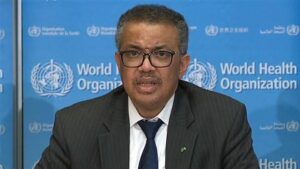“Today and tomorrow, WHO is holding a second research and innovation forum, bringing together more than 1000 scientists from all over the world to take stock of the progress made so far, to discuss new research questions and knowledge gaps, and to define research priorities for the remainder of this year and beyond,” says the Director of the World Health Organization, Dr Tedros Adhanom Ghebreyesus yesterday as he made an opening remark on the media briefing of Covid-19.

Dr Tedros Adhanom Ghebreyesus.
After extending courtesy greetings, seemingly referring to readers and listeners in all parts of thw world, he started by saying that “More than 10.3 million cases of COVID-19 have now been reported to WHO, and more than 506,000 deaths… number of new cases has exceeded 160,000 on every single day. 60% of all cases so far have been reported just in the past month”.
He also said “We will never get tired of saying that the best way out of this pandemic is to take a comprehensive approach” and also encouraged that every case of covid-19 should be found, isolated, tested and treated with care; with covid-19 awareness spread across communities for safety reasons. He also included that health workers should be trained.
He then adviced that the WHO guidelines should he adhered to : “Not testing alone. Not physical distancing alone. Not contact tracing alone. Not masks alone. Do it all.”
“Countries that have adopted this comprehensive approach have suppressed transmission and saved lives.Flare-ups are to be expected as countries start to lift restrictions. But countries that have the systems in place to apply a comprehensive approach should be able to contain these flare-ups locally and avoid reintroducing widespread restrictions. However, we are concerned that some countries have not used all the tools at their disposal and have taken a fragmented approach.These countries face a long, hard road ahead.” He said.
“But one of the lessons of the pandemic is that no matter what situation a country is in, it can be turned around. It’s never too late.” He added.
Dr. Ghebreyesus reminded the public that “Italy and Spain were the epicenter of the pandemic,” with Spain having almost 10,000 cases a day, and Italy, more than 6,500 cases in March but they were able to handle the situation because they worked together, combining “leadership, humility, active participation by every member of society, and implementing a comprehensive approach. Both countries faced a daunting situation, but turned it around.”
He also said that “the fastest way out of this pandemic is to follow the science and do what we know works: the comprehensive approach.”
“Today and tomorrow, WHO is holding a second research and innovation forum, bringing together more than 1000 scientists from all over the world to take stock of the progress made so far, to discuss new research questions and knowledge gaps, and to define research priorities for the remainder of this year and beyond.”
He mentioned the fact that “research and innovation have played a vital role since the beginning of the pandemic and even before,” and also went ahead listing the progressive events of WHO from January to April 2020 relating to the pandemic.
“And in April, with the European Commission and multiple other partners we launched the Access to COVID-19 Tools Accelerator, to catalyse the development and equitable allocation of vaccines, diagnostics and therapeutics.”
“This pandemic is a scientific challenge, but it is also a test of character. We must act in the interests of global solidarity and our shared humanity.” He said.
“We have a shared responsibility to ensure that all people have access to the tools to protect themselves, especially those who are most at risk. Although the pandemic is global, there are differences in the experience and approach of each region and country. Over the next few weeks, we plan to feature a different region regularly, to highlight the challenges in different parts of the world, and the lessons we are learning.”
“Today we’re starting with the Eastern Mediterranean region – comprising much of the Middle East and North Africa – which is the third-most affected region globally, after the Americas and Europe”.
Image Credit: nbcnews



